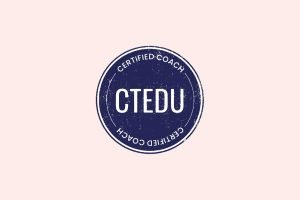Last updated on July 29, 2024
Have you decided to pursue a life coaching career without certification? Are you perhaps not ready to enroll in a training program, but you want to set up your coaching business? Then this is the post for you.
If you embark on researching this question on your own, you’ll surely face an overwhelming amount of information on how to become a life coach without certification—so we’ll make it simple. Let’s unravel the key steps that will build the bridge between aspiration for life coaching and a running life coaching practice.
Table of Contents
Can You Be a Life Coach Without Certification?
There are currently no official regulations or legal requirements for education, training, or credentials in the life coaching industry. This means that anyone can label themselves as a life coach and start working with clients right away. The decision to pursue certification depends on individual preferences and goals.
However, it’s important to note that while a formal life coach certification may not be necessary, it’s crucial to have a deep understanding of the profession and the responsibilities it entails. While certification may not be mandatory, acquiring proper knowledge and skills is essential for success and providing quality coaching services.
Can You Be a Self-Taught Life Coach?
Even though most coaches do hold a certification (81.3%), there’s nothing stopping you from choosing a different route and being self-taught. There are many free resources online that enable those who don’t mind doing extensive research to acquire coaching techniques and knowledge. You have the freedom to hone coaching skills on your own and, through personal and professional experience, gather insight related to the coaching field of your interest.
Here are some of the essential traits that life coaches should possess:
- Communication skills
- Confidence
- Empathy
- Vast knowledge and experience in the field of their interest
- Compassion
- Interpersonal skills
- Active listening skills
- Resilience
- Persistence
How To Become a Life Coach Without Certification
Without further ado, let’s discuss several crucial steps that will help you build a coaching business without certification.
1. Choose a Coaching Niche
Specializing in a specific life coaching field isn’t necessary, but it can help you set yourself apart and focus on a particular target audience.
While casting a wider net may seem like a wiser choice, the fact is that when you direct your passion toward a specific area, you can develop a deep understanding of the unique challenges and needs faced by clients in that particular area and provide them with more targeted and effective coaching solutions.

It will also be easier and more manageable to research, read books, and learn from other coaches if you narrow your focus to a certain field.
Here’s a list of the most popular niches in the life coaching industry:
- Relationship coaching
- Confidence coaching
- Health and wellness coaching
- Self-care coaching
- Cognitive behavioral coaching
- NLP coaching
- Holistic life coaching
- Law of attraction coaching
- Manifestation coaching
- Mindfulness coaching
- Life purpose coaching
- Spiritual coaching
- Happiness coaching
- Intuitive coaching
- Somatic coaching
- Career coaching
- Writing coaching
- Transition coaching
- Retirement coaching
- High-performance coaching
- Executive function coaching
- Accountability coaching
- Innovation coaching
- Autism coaching
- Marriage coaching
- Pregnancy coaching
- Parenting coaching
- Divorce coaching
- Intimacy coaching
- Sexuality coaching
If you’re uncertain how to find your niche, you might find this post helpful.
2. Find a Mentor
Certification programs often include mentoring as a part of their education; however, you can connect with a mentor even without purchasing a training program. Find an experienced coach in your field and reach out to inquire whether they are willing to work with you.
Teaming up with someone more experienced can help you avoid common mistakes and give you insight into the most effective approaches in coaching. They might also let you shadow their coaching sessions and observe their techniques.

Be prepared that not every coach will accept this proposition, so it’s best to have backup options rather than putting all your hopes in one individual.
3. Create Your Signature Program
A signature program is a coaching program that encompasses your best advice, content, and practices. To develop a signature program, you first need to determine what makes your coaching method and style unique and different from others. You should clearly outline the measurable result of your coaching and implement a unique approach to reach it.
The signature program will serve as the foundational launch pad for every aspect of your business and bring you benefits such as:
- Establishing your expertise in a chosen niche
- Identifying your ideal client
- Targeting your marketing campaigns and tailoring your message to resonate with your audience
- Shaping your organic traffic strategy
- Building successful sales funnels
- Streamlining your business operations
4. Set Up Your Online Presence
Your online presence and personal brand are how you’ll promote your business, attract the right clients, and enhance your credibility. The most basic step is setting up your own website and social media profiles. However, to boost your online visibility, you also need to optimize your content, so you might consider learning more about SEO and copywriting.
If you want to simplify setting up the website, creating your coaching program, scheduling sessions, and other aspects of running a coaching business, you can employ coaching software like Paperbell, Delenta, CoachVantage, and Practice.do.
5. Start Networking
Building connections with fellow coaches presents a wealth of opportunities for mutual promotion, collaboration, and expanding your network, which can greatly contribute to reaching new clients. You might even discover potential clients among fellow coaches.

If you want to engage in networking, consider attending coaching events, participating in coaching meet-ups, or connecting with coaching professionals through your mentor. This can open doors to meaningful connections, valuable referrals, and a supportive community.
What Are the Benefits of Certification?
If you’re undecided about whether or not to get a certification, to make this a fair fight, we’ll briefly review the advantages of life coaching certification:
- Structured learning path
- Time-saving method of acquiring skills, tools, and techniques
- Learning the tricks of the trade directly from experienced coaches
- Practicing your coaching skills through peer coaching or coaching exercises with real clients
- Establishing yourself as an expert in the industry
- Simplifying your networking efforts
- Building trust in clients
- Attracting clients who seek coaches who are certified
- Expanding your client pool (some coaching programs list you in their coach directory)
In addition, obtaining accreditation from globally recognized entities such as the International Coaching Federation (ICF) will enhance your recognition both among clients and coaches. When it comes to ICF-accredited programs, our top selection is Coach Training Alliance, which you can learn more about in our CTA review).
In case a budget poses an issue, you can find affordable training programs such as Transformation Academy, which we have thoroughly reviewed.
Special Offer: Get 50% off all certification programs at Transformation Academy by clicking our link or entering code LIFECOACHMAG at checkout.
FAQs
- How much does a life coach make?
The average salary of a life coach ranges between $62,500 and $245,000 a year, according to iPEC.
- How much does a life coach certification cost?
The wide array of life coaching certification programs is paralleled by a huge difference in their costs. You can expect to pay anywhere from less than $100 to over $10,000 for coaching certification.
- Does accreditation matter in a life coach certification program?
Accrediting institutions verify whether a program’s curriculum and practices are in line with their set standards. While this credential isn’t necessary, accreditation can boost your recognition.
- What is the most recognized coaching certification?
The increasing number of available coach training programs makes it difficult to keep up with all the legit and prominent programs in the industry. The most direct path to gaining recognition is earning an accredited certification by well-known accrediting bodies like the International Coaching Federation (ICF) and the Continuing Professional Development (CPD) Standards Agency.
Conclusion
The coaching industry gives you the freedom to choose your own path to launch your coaching business. Not even the lack of certification can stand in your way if you’re driven by the passion to help others and guide them toward a more fulfilling life.
If you don’t feel ready to enroll in certification training at the moment but do plan to do so one day, our recommendations are Transformation Academy as the best budget option and Coach Training Alliance for hands-on learning. You can also explore our list of the top life coach certification programs for more options.
Take the Coach Certification Quiz
Need help choosing a coach training and certification program? We created this short quiz to help you find the best program for you.
Take the quizThe Life Coach Magazine staff is your team for high-quality content on topics from personal development, to coaching tips, to how to grow your coaching business.

















Be First to Comment